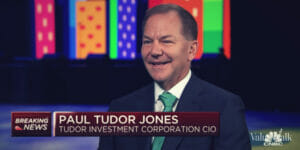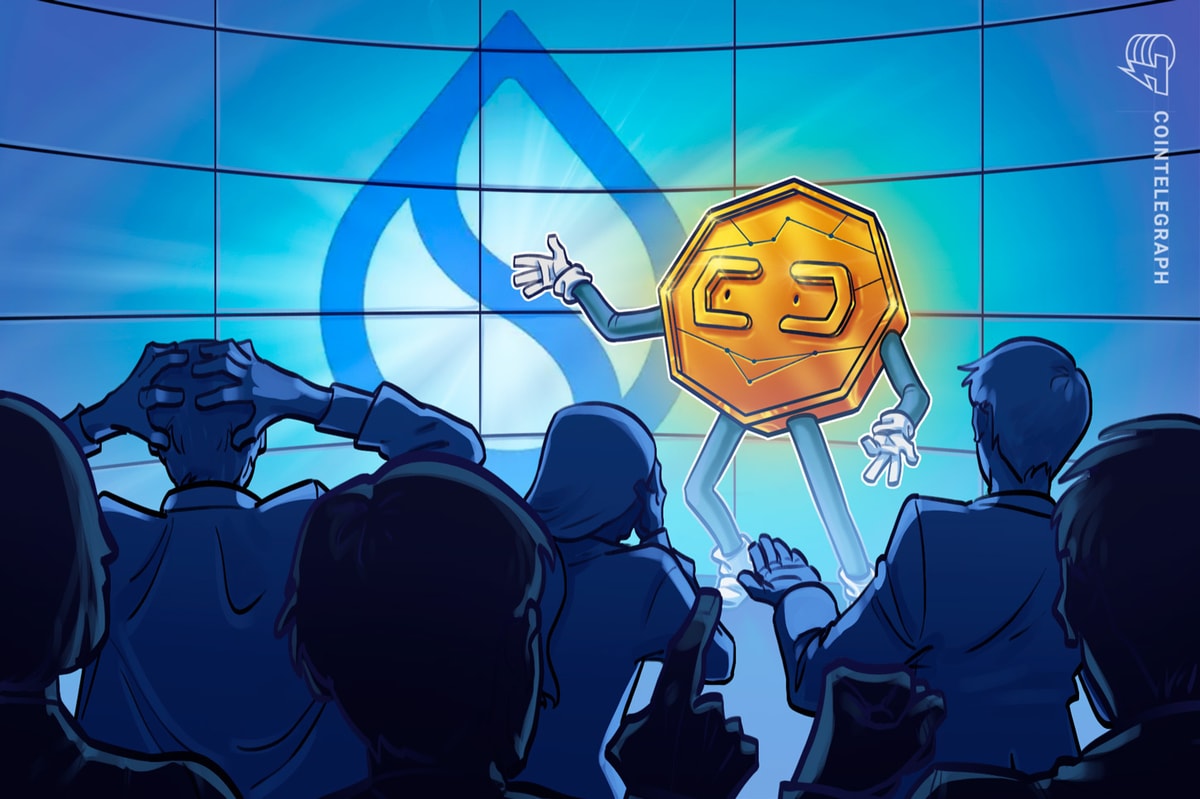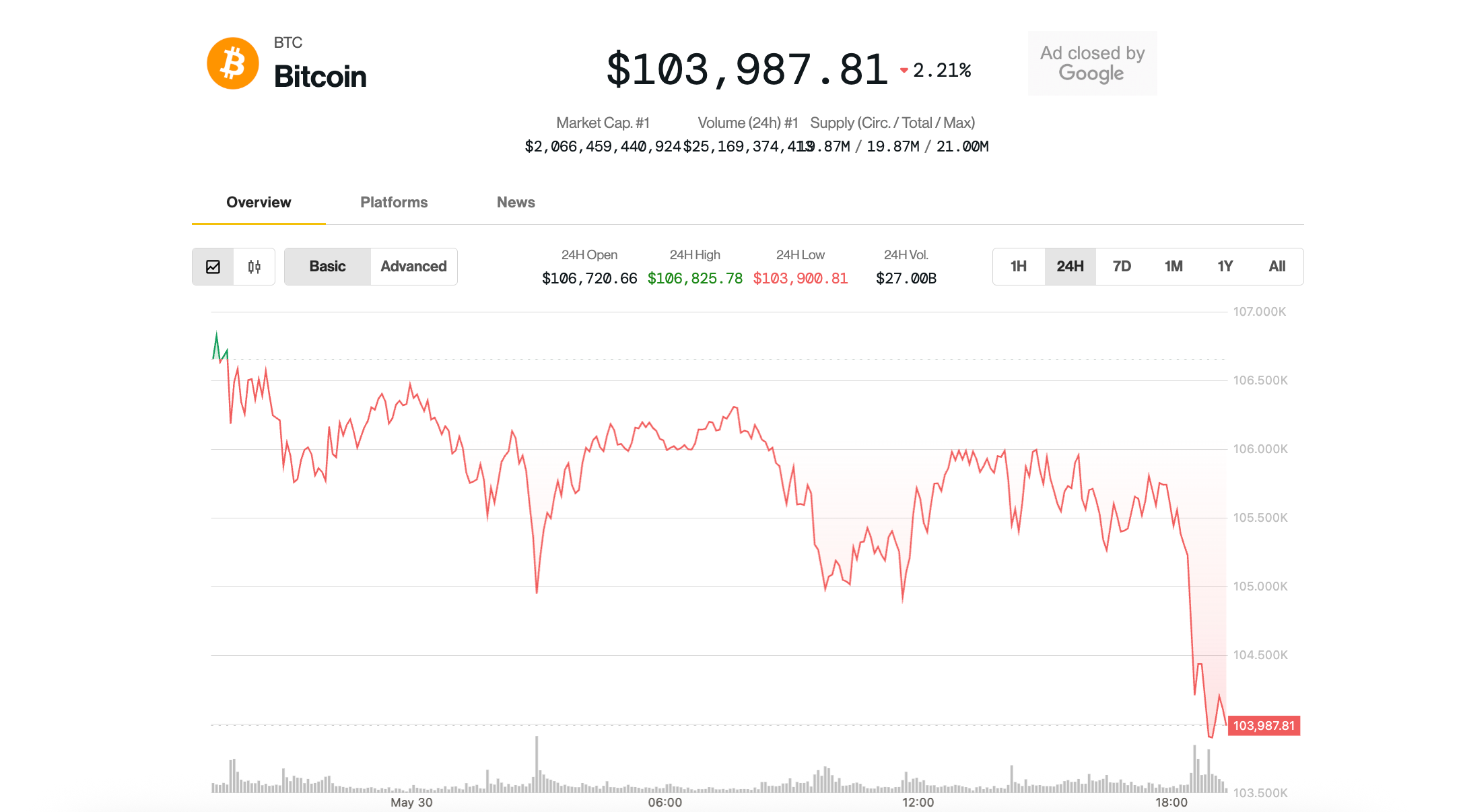
Following is the unofficial transcript of a CNBC exclusive interview with Tudor Investment Corporation Founder & CIO and Robin Hood Foundation Founder Paul Tudor Jones on CNBC’s “Squawk Box” (M-F, 6AM-9AM ET) today, Monday, May 15, 2023. Following are links to video on CNBC.com.
ANDREW ROSS SORKIN: We’re here at the Javits Center Convention Center with a very special guest this morning. Joining us right now in an exclusive interview is legendary trader Paul Tudor Jones, of course, the founder and CIO of Tudor Investment Corporation, but also the founder and why we’re here right now of the Robin Hood Foundation, which is holding its annual gala here this evening and they’re getting ready literally as we speak. Nice to see you sir.
PAUL TUDOR JONES: It’s great to see you, Andrew.
Paul Tudor Jones Says The Fed Is Done Raising Rates, Stocks To Finish The Year Higher From Here
SORKIN: I want to talk about Robin Hood and we’re gonna get there in a moment. But I actually want you to react a little bit to this Austan Goolsbee interview and some of his comments. I’m curious where you think interest rates, will go, should be what do you think?
TUDOR JONES: I think they’ve done hiking. I’m so glad I don’t have this job because listening to these guys try to not say what they really want to say and what they really think.
SORKIN: What do you think he really wants to say?
TUDOR JONES: He wants to say we’re done. We’ve gone too far and enough’s enough. That’s that’s what he wants to say. He just can’t say that because he’s new, is new on the board and he has to follow the chairman but that’s what he wants to say.
SORKIN: And what do you want to say?
TUDOR JONES: I think he’s right. I think they’re done.
SORKIN: You think they are done?
TUDOR JONES: Oh definitely I think they’re done. I mean, they could probably declare victory now. Because if you look at CPI, it’s been declining 12 straight months, 12 straight months, that’s never happened before in history. So there’s a strong downward arc to inflation at the moment to your breakevens are under 2%.
Clearly, they have to be governed by trailing 12-month inflation. But if we get to the here and now, you can see that inflation to a great extent has been wrung out of the market. Now, does that mean that we’re getting ready to imminently cut? No, but you got to think of interest rates a bit like chemo.
So chemo, chemotherapy, chemo is poison. Interest rates with the kind of amount of sector wide debt that we have between privates, consumer and the government, we’re probably at levels where we’ve typically hit a recession in the past because of the interest tax on the economy.
So we’re at a level that historically has really slowed the economy, and historically has kicked off a recession. I think it’s just a question of waiting for that tax on the economy to work its way through.
SORKIN: Mistake then for them to raise interest rates?
TUDOR JONES: Would have been a jump ball for me. I would have been 50/50 on the last one. I could have been talked out of it. I would have been reluctant to do it. The only reason why I probably would maybe have gone along with it is because I think equity prices are going to get, I think they’re going to continue to go up this year and the financial cycle drives so much of the business cycle so.
SORKIN: Let me just pick up on what you just said. You said you think equity prices are going to go up this year?
TUDOR JONES: Oh yeah.
SORKIN: So you think they’re going to end higher than where we are right now?
TUDOR JONES: Oh yeah.
SORKIN: Okay, real economy is going to be?
TUDOR JONES: Could go into recession in third or fourth quarter. And when I say we’re going to be higher, I’m not rampantly bullish because I think it’ll be a slow grind. You just got as we had if I if I go back to the ’06, ’07 and ’08 episode, we stopped hiking in June of ’06.
And even though the economy was decelerating, the stock market ground higher for another year and change. And I look at the flow of funds situation, which is what I like to look at it in ’06 and I look at it now and they’re very similar. We got a trillion dollars of buybacks.
We have no IPOs, no calendar, no secondaries, valuations are at 19 but nobody’s rushing to offer so clearly, something is going on internally in the stock market. And by that I mean from a flow standpoint that’s constructive.
SORKIN: Okay, let me ask you this. We had Stan Druckenmiller who was on the air just last week I think and he made this comment that given the remarkable margins in corporate America today, he said it’s possible that stocks don’t basically move anywhere for 10 years.
TUDOR JONES: I think that’s I think we’re in just a big, massive trading range. I think on that point, he’s correct—
SORKIN: Do you think he’s—
TUDOR JONES: A multi-year trading range. But if you had told me if you’d asked me six months ago, I’d probably give you a different forecast on long term inflation and I’d give you a different forecast on the stock market.
SORKIN: But you think that for 10 years, we might be in a trading range for the next 10 years?
TUDOR JONES: Well, I think we’re gonna have a more bifurcated market than we’ve ever had over the course of the next five or 10 years because I do think that the introduction of large language models, artificial intelligence is going to create a productivity boom that we’ve always seen a few times in the last 75 years.
So just to be clear, if you think about that the big productivity miracles that we’ve had since the war, you had one in the late 50s, which was really a delayed reaction to the infrastructure investment postwar in the early 50s. Then we had one in the 80s because the introduction of the PC and then we had one in the 90s because of the introduction of the internet.
Each of those three episodes were associated with productivity gains of somewhere between 1 and 3%. So figure let’s say that this large language models gonna give us a productivity boom of 1.5% over the next five years per year which I think’s possible. We’ve had the fastest adoption of them in history, right. So if that’s the case, now, just go back and look historically what that’s done during those productivity miracles.
You’ve had the stock market on average kind of appreciate 15% per year. You’ve had inflation come down. This is literally a gift to the central bank, say 30 to 50 basis points, certainly in the early years, and you’ve had a P/E expansion of somewhere between 1.5, 2. So I think this one, there’ll be some I think this will be more bifurcated than it was back in those other ones. But yes, that makes me think the tide is coming in for the stock market.
SORKIN: So that’s that’s a good thing for the stock market except then you said a trading range for, you said you’ve agreed with Stan Druckenmiller, which would suggest the sort of Warren Buffett school of buy the S&P 500 and hold it would maybe not be what you would do.
TUDOR JONES: What I mean is we have different cycles that are going to be competing with each other in the short, intermediate and long run. We have a long-term productivity boom that’s going to come from LLMs that within the stock market—
SORKIN: That’s AI, large language models.
TUDOR JONES: Right, AI. That within the stock market, they’re going to be huge winners and huge losers. So he can be right and I can be right because there’s gonna be some big winners and big losers.
SORKIN: Okay, layering into this though. The banking crisis that we’re living through today, and the debt ceiling debate.
TUDOR JONES: I’m gonna need a model to figure all this out, right. So the debt ceiling debate reminds me I just had my first granddaughter three weeks ago.
SORKIN: Congratulations.
Paul Tudor Jones: A ‘Really Good Chance’ We’ll Be On The Verge Of Recession In Q3
TUDOR JONES: And I forgot, thank you very much. I forgot when you’re holding that baby that after they’ve been feeding that they tend to do a little throw up all the time, right. So I think that’s what this this debt ceiling is going to be. It’s going to be kabuki theater, a little throw up.
And the real question is, where are we going to be a month from now? A month from now, after it’s resolved then where are two-year rates. My guess is they may be a little higher because they’re risk premiums in everything.
Risk premiums gold risk premium stocks, risk premium in rate structures because we’re all terrified of the debt ceiling. So if those are gone, stocks are probably a little higher, gold’s probably a little lower, rates might be a touch higher because those risk premiums will disappear. So you have, that’s the very shortest term.
SORKIN: So you buy on that if you think a deal gets done?
TUDOR JONES: Yeah, I think you’ll have I think you’ll have some kind of indigestion along the way and yes, I’d buy back. Then we have in a more intermediate basis, we have the financial cycle, the financial cycle which is what we kind of look at internally, is the combination of the historical debt and asset valuation boom bust.
So if you think about post-Covid, we had this massive increase in debt, massive increase in equity valuation, it creates this boom in the financial cycle. That’s happened in 1990. That happened in 2000. That happened in 2008. Our financial cycle, the peak of total debt growth plus stock market valuation occurred in September of 2021.
Historically, it’s about a two-year lag when that really, really bites and you go into recession. That would be third quarter this year. There’s a good chance based on our most recent financial episodes, there’s a really good chance that we’re going to be on the verge of looking like or actually going into a recession.
SORKIN: So we’re in a recession but you think then the stock market’s higher because it’s looking at 12 months after?
TUDOR JONES: Because I think again, if I just think about this year, and I think about ’06, ’07, ’08, it doesn’t mean that the stock market cannot go higher as the economy decelerates. If you just think about if that was the last, if that was the last hike that we just had, the playbook’s real simple.
Six months from now stocks are 10% higher, six months from now interest rates are generally 50 to 70 basis points lower. There’s a Halcyon period post last hike where asset prices do okay, commodities barely recover, the dollar kind of does nothing.
SORKIN: I’d referenced this banking crisis that we’re in. I don’t know if you think it’s a crisis or something else. How does that factor in and where do you think we are?
TUDOR JONES: I think that’s one of the reasons why that was the last hike. I mean, this banking crisis, it’s troubling to me because we just killed three big banks. And when I say we, I think bad monetary policy, combined with bad fiscal policy, created a situation that never had to happen. We knew in the fourth quarter of 2020, it was so obvious we were going to have a vaccine.
But we continued with quantitative easing for an entire year after that. And the whole time, we’re telling everyone rates are going to stay low forever. Inflation is not an issue. We’re trying to get inflation above 2%.
The bags – anyone that was listening to our Fed at that point in time, was probably doing exactly what these banks did, extending maturities because they were being told that inflation didn’t exist when it finally did come as transitory and rates were going to be low forever.
We did not have to have all that over stimulus. And then all of a sudden we found out inflation wasn’t transitory. We had to – they had to course correct an over exaggeration of what they were doing in 2020 monetary policy.
SORKIN: Okay, I got a different one for you, Bitcoin. You came on our air during the early part of the pandemic, I think it was trading at $8,000, $9,000 a coin.
TUDOR JONES: Yeah.
SORKIN: And you said, I’m in.
TUDOR JONES: Yeah.
SORKIN: And I think you rode it all the way up to 60 – some odd thousand dollars.
TUDOR JONES: Yeah.
SORKIN: And then rode it back down to $15,000. And we’re now sitting I think somewhere around $27,000.
TUDOR JONES: I’ve never sat on a horse that long, just so you know.
SORKIN: So what’s the – you’re still on the horse, though.
TUDOR JONES: From the beginning have always said I want to have a small allocation to it, because it’s a great tale event. It is the only thing that humans can’t adjust the supply in and so I’m sticking with it. I’m gonna always stick with it as just a small diversification in my portfolio. What do I think right now? I liked it last December. I still think I mean –
SORKIN: Would you buy more right now?
TUDOR JONES: Would I buy more? I would probably, I’m kind of – I look at it in gold and I think they’ve done so well recently because of the fact that we have had these great risk premiums. I wonder whether they may not be boring in the future.
So Bitcoin has a real problem because the United States you have entire regulatory apparatus against it. So it’s just kind of yesterday’s news. And if inflation is truly done a bit, if that story’s been played, then you have to wonder we were buying gold and Bitcoin for the inflation hedges.
That game maybe over. I would – six months ago, before AI, before the possible productivity boost that we’ll get for it, I would have said a completely different story with regard to inflationary future and with regard to all the inflation hedges.
SORKIN: I got a different one for you. You spend a lot of time thinking about ESG.
TUDOR JONES: Right.
SORKIN: And we have this big fight going on in the state of Florida, between Disney and DeSantis. Disney thinking that it’s speaking out using its First Amendment right, on behalf of its workers, something that most of your polls, historically have shown to be the thing that companies are supposed to do –
TUDOR JONES: Right.
SORKIN: And yet on the other side, there’s the political punishment that’s coming along with that. And I think a lot of CEOs are looking at that and saying, I don’t know if I’m supposed to speak out anymore.
TUDOR JONES: Yeah, I’m not sure. If I just think about what all our polling at JUST Capital says, the pocketbook issues are by far and away the most important issues for corporate America. The pocketbook issues. Am I getting paid a fair and living wage?
Once we get in to the politics, of a variety of issues, the importance of those issues fall dramatically down the scale. So it’s tragic to me that we would have one of the biggest employers and if not the biggest employer in Florida and the governor in a fight. It’s tragic. I would hope they would both stand down.
SORKIN: Let’s talk about tonight. You’ve been doing this now 35 years. This is quite something. There’ll be 3,000 people that are going to pack this place.
TUDOR JONES: 4,000.
SORKIN: 4,000.
TUDOR JONES: We are over more than sold out.
SORKIN: A lot of folks from Wall Street and corporate America. What are you expecting to happen tonight and also given the economic environment, I mean, one of the things that happens every year which you raise millions upon millions of dollars and it’s a spectacle, frankly, to see the numbers light up the screen. What are you anticipating happens this evening, especially given the economic environment?
TUDOR JONES: Well, let me just say first of all tonight is going to be unlike any other night in our 35-year history, We’ve got some surprises that are going to be absolutely spectacular. I think that people’s desire to do good and to help and to believe in community are just as strong as they are now, as they were in our entire history.
So I expect people to show up and to give. I just want to – and this is a spoiler alert for people who are coming tonight. I was previewing this video that we did on – that we’re going to show tonight on Association to Benefit Children run by the U.S.’s Mother Teresa, Gretchen Buchenholz.
And in the video, it shows this AIDS orphan from the 90s and how they tracked this AIDS orphans from the early 90s all the way to now and how he’s turned into this incredibly wonderful, giving human being, father and teacher. And while I was watching I was sitting there going, “Oh, my Lord.” I had this visceral impact because I remember being at ABC in the early 90s.
We were having our board meeting there. And I remember Gretchen taking us into their maternity ward where all these AIDS babies were lying and crying. Swaddled babies crying. And she said, “We don’t have enough people to hold them.
They just want to be held.” And so all of us took a baby and I was sitting there thinking, “Oh my gosh, there’s a really good chance that I held – I either held Victor or his brother Eric at that point in time.” And at the time, we didn’t know much about AIDS. We had no idea what it was. We thought we were just holding these doomed children, children of God for some momentary respite or sucker.
And I see that video and going, “Oh my Lord. They made it. He made it.” He made it because of ABC. He made it because we’ve been supporting them forever. And it dawned on me, generational continuity enables generational change.
SORKIN: Paul Tudor Jones, I want to thank you for your time this morning, your insights, and we wish you a lot of luck this evening with the one most important causes in New York. Thank you again, so much. Joe, back to you.
Read More: bitcoinwarrior.net









 Bitcoin
Bitcoin  Ethereum
Ethereum  Tether
Tether  XRP
XRP  Solana
Solana  USDC
USDC  Dogecoin
Dogecoin  TRON
TRON  Cardano
Cardano  Lido Staked Ether
Lido Staked Ether  Wrapped Bitcoin
Wrapped Bitcoin  Wrapped stETH
Wrapped stETH  Hyperliquid
Hyperliquid  Sui
Sui  Chainlink
Chainlink  Avalanche
Avalanche  Stellar
Stellar  LEO Token
LEO Token  Bitcoin Cash
Bitcoin Cash  Toncoin
Toncoin  Shiba Inu
Shiba Inu  Hedera
Hedera  USDS
USDS  WETH
WETH  Litecoin
Litecoin  Wrapped eETH
Wrapped eETH  Polkadot
Polkadot  Monero
Monero  Binance Bridged USDT (BNB Smart Chain)
Binance Bridged USDT (BNB Smart Chain)  Bitget Token
Bitget Token  Ethena USDe
Ethena USDe  Pepe
Pepe  Pi Network
Pi Network  WhiteBIT Coin
WhiteBIT Coin  Coinbase Wrapped BTC
Coinbase Wrapped BTC  Dai
Dai  Aave
Aave  Uniswap
Uniswap  Bittensor
Bittensor  OKB
OKB  Aptos
Aptos  Cronos
Cronos  Ethena Staked USDe
Ethena Staked USDe  NEAR Protocol
NEAR Protocol  BlackRock USD Institutional Digital Liquidity Fund
BlackRock USD Institutional Digital Liquidity Fund  Jito Staked SOL
Jito Staked SOL  Tokenize Xchange
Tokenize Xchange  Ondo
Ondo  Ethereum Classic
Ethereum Classic